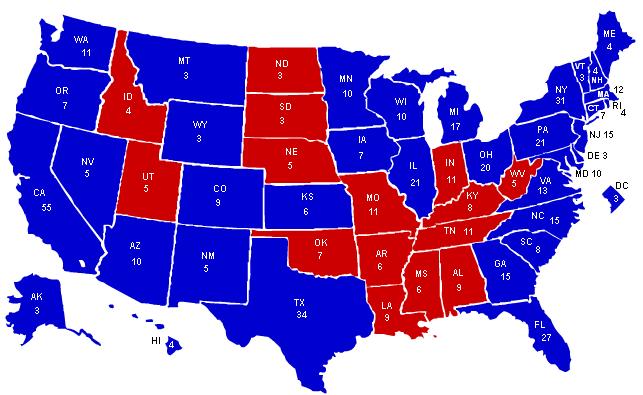Abortion, Extremists, and the Myth of the Moderate Republican
I apologize if this entry is rather long, but there's a lot I've wanted to say about abortion.
First, we start with mainstream American thinking on abortion. Support for Roe vs Wade has fluctuated over the years, but has never enjoyed less than a majority support. SurveyUSA took a state-by-state poll recently surveying the attitudes on abortion within each state. The results may surprise some people. In only 10 states does the pro-life position enjoy outright majority support. These states are Utah, Louisiana, Arkansas, Idaho, Alabama, Mississippi, West Virginia, Kentucky, Tennessee, and Indiana. Furthermore, in only 15 states does pro-life gain more support than pro-choice. To get a better sense of things, I've colored an electoral map based on how each state would vote on the single issue of abortion. Red is of course pro-life and blue is pro-choice.

It is striking how blue the map is. Even at a state-by-state level, abortion rights are supported by a broad section of the country, with heated opposition arising primarily in the south and great plains. Even then, states such as South Carolina and Georgia would support abortion rights.
So if the majority clearly supports keeping abortion legal, why do pro-life forces seem to be winning the battle? There are several reasons I want to dissect.
First, the pro-life/pro-choice distinction cuts across party lines. Many wealthy Republicans are pro-choice, but place greater importance on economic issues at the voting booth. Analogously, many Democrats, especially Catholics, are pro-life but care more about poverty and war. According to a Quinnipiac poll, the numbers break down as follows on the question of whether Roe should be upheld.
| Uphold | Overturn | Unsure | |
| % | % | % | |
| ALL | 50 | 34 | 16 |
| Republicans | 36 | 47 | 17 |
| Democrats | 59 | 26 | 14 |
| Independents | 55 | 30 | 15 |
A clear majority may support abortion rights, but it seems a chunk of that majority are Republicans who are fairly apathetic towards the issue.
Still, given this level of support, it is hard to imagine any anti-abortion zealot being elected. Here is where I think the right wing has triumphed. The Republican message is full of phrases such as "culture of life" that make their position sound more moderate and mainstream than it actually is. Additionally, they've been able to demonize more reasonable voices by tagging them to the horrendous sounding procedure "partial-birth abortion."
On the other side, activists seem to be blind to their losing fight. As Amy Sullivan writes, pro-choice forces seem hellbent on purging anything but the strictest rhetoric on abortion while shooting themselves in the foot in the process.
But the final straw came when Senate Democrats acted on this advice and recruited pro-life Democrat Bob Casey to run against Rick Santorum for Pennsylvania's Senate seat in 2006.Pro-choice advocates lashed out. National Organization for Women president Kim Gandy called out Kerry and Dean by name, and declared: ''If that's what it means to have a big tent, if it means abandoning the core principles of our party, if it means throwing women's rights overboard like so much ballast...then I say let's keep the skunk out of the tent." ... The race appears to have become a test case for many in the pro-choice community. They would rather see Casey lose than defeat Santorum, perhaps the Senate's most vociferous abortion opponent.
As if to underline their point, NARAL took the unusual step of endorsing Senator Lincoln Chafee, Republican of Rhode Island, a full year and a half before the 2006 election. The message was clear: a pro-choice Republican is always preferable to a pro-life Democrat.
It didn't take long for NARAL to regret the move. Less than three weeks later, Chafee voted to support the nomination of radically conservative judge Janice Rogers Brown. NARAL issued an angry press release, warning Chafee that they would be ''watching closely his future votes on judicial nominees, including...those for the Supreme Court." Now, of course, Chafee has announced he will vote in support of Roberts. Meanwhile, the pro-life Reid--exactly the type of Democrat these groups would see defeated if they had their way--has announced that he will vote against Roberts's confirmation.
It is patently stupid for NARAL to go after Hillary and other Democrats who have softened their rhetoric on abortion. Because when it comes time to actually vote, the Democrats have consistently stood for abortion rights. 22 Democratic senators voted against John Roberts, including the traitor Hillary and pro-life minority leader Harry Reid. Not one Republican did, including so-called "moderate, pro-choice" ones like Specter and Chaffee. Yet, NARAL continues to throw a temper tantrum on how Democrats are abandoning them. If pro-choice activists don't pull their collective heads out of their asses, we are going to lose this fight permanently.


